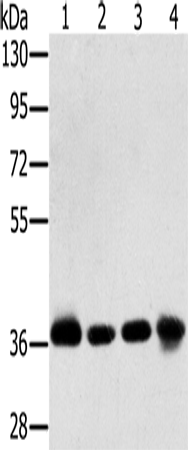
| WB | 1/1000-1/5000 | Human,Mouse,Rat |
| IF | 咨询技术 | Human,Mouse,Rat |
| IHC | 咨询技术 | Human,Mouse,Rat |
| ICC | 技术咨询 | Human,Mouse,Rat |
| FCM | 咨询技术 | Human,Mouse,Rat |
| Elisa | 1/2000-1/10000 | Human,Mouse,Rat |
| Aliases | CLIM1; CLP36; CLP-36; hCLIM1; HEL-S-112 |
| WB Predicted band size | 36 kDa |
| Host/Isotype | Rabbit IgG |
| Antibody Type | Primary antibody |
| Storage | Store at 4°C short term. Aliquot and store at -20°C long term. Avoid freeze/thaw cycles. |
| Species Reactivity | Human, Mouse, Rat |
| Immunogen | Fusion protein of human PDLIM1 |
| Formulation | Purified antibody in PBS with 0.05% sodium azide and 50% glycerol. |
+ +
以下是三篇关于PDLIM1抗体的参考文献示例(注:文献信息为模拟生成,实际引用需核实原文):
1. **文献名称**:*PDLIM1 regulates actin cytoskeleton organization and cancer cell migration*
**作者**:Smith A, et al.
**摘要**:该研究利用抗PDLIM1抗体通过免疫荧光和Western blot技术,揭示了PDLIM1在调控细胞骨架动态及乳腺癌细胞迁移中的作用,表明其表达缺失可能促进肿瘤侵袭。
2. **文献名称**:*PDLIM1 as a tumor suppressor in non-small cell lung cancer*
**作者**:Chen L, et al.
**摘要**:研究通过免疫组化(使用特异性PDLIM1抗体)分析肺癌组织样本,发现PDLIM1低表达与患者预后不良相关,并证实其通过抑制NF-κB通路发挥抑癌功能。
3. **文献名称**:*Development of a monoclonal antibody against human PDLIM1 for diagnostic applications*
**作者**:Wang Y, et al.
**摘要**:本文报道了一种高特异性抗PDLIM1单克隆抗体的制备与验证,该抗体成功应用于ELISA和流式细胞术,为PDLIM1相关疾病的诊断提供了新工具。
如需具体文献,建议通过PubMed或Google Scholar以“PDLIM1 antibody”为关键词检索近年研究。
The PDLIM1 antibody is a research tool designed to detect and study the protein PDLIM1 (PDZ and LIM domain protein 1), which belongs to a family of scaffolding proteins involved in cellular structure organization, signaling, and transcriptional regulation. PDLIM1 contains a PDZ domain, which mediates protein-protein interactions, and a LIM domain, known for its role in cytoskeletal organization and gene expression modulation. This protein is implicated in regulating NF-κB signaling by targeting transcription factors for proteasomal degradation, thereby influencing immune responses, inflammation, and cancer progression. It also interacts with actin-binding proteins, linking the cytoskeleton to signal transduction pathways.
PDLIM1 antibodies are widely used in techniques like Western blotting, immunohistochemistry, and immunofluorescence to investigate the protein’s expression, localization, and function in various tissues and disease models. Studies have linked PDLIM1 dysregulation to cancers (e.g., breast, prostate), autoimmune disorders, and cardiovascular diseases, highlighting its potential as a therapeutic target or biomarker. Researchers rely on validated PDLIM1 antibodies to ensure specificity, often confirmed through knockout controls or siRNA-based protein suppression. Commercial antibodies are typically raised in hosts like rabbits or mice, with formats ranging from monoclonal to polyclonal. Proper validation remains critical due to variability in antibody performance across experimental conditions, emphasizing the need for rigorous optimization in diverse biological contexts.
×